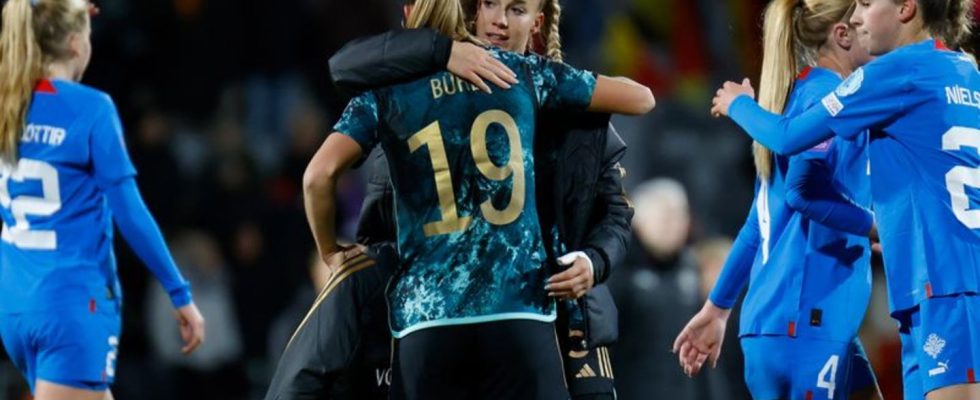DFB women
“Much calmer, much clearer”: Hrubesch sees room for improvement
Giulia Gwinn (back) and Klara Bühl secured the DFB victory in Iceland. photo
© Brynjar Gunnarsson/dpa
The Hrubesch effect gave the German national soccer players a little peace and brought them two victories. But a few deficits remain.
Be afraid of unpleasant truths Horst Hrubesch didn’t go back. “We just have to play better,” said the interim national coach when asked to analyze the unadorned 2-0 win in Iceland.
“Much calmer, much clearer,” he added, referring to the missed chances: “Sometimes the last pass didn’t come, sometimes we also played bad balls.”
As in the 5-1 win against Wales, the German team looked like an engine that had been filled with the wrong fuel. Nevertheless, the Hrubesch effect has by no means fizzled out, the direction is right, fun and a good mood are back among the national soccer players.
Increased confidence
Confidence has grown before the crucial Nations League game against Denmark. “We can set off fireworks at home,” said winger Klara Bühl on Tuesday evening at sportstudio.de with a view to the duel on December 1st in Rostock, which is so important for Olympic qualification. Only with a 2-0 win or a win with a three-goal difference against the Danes would interim national coach Horst Hrubesch’s team have the group victory in their own hands in the final game in Wales (December 5th), which is necessary for them to move on to the Olympics.
Only the group winner will reach the Nations League final round of the best four teams next spring. The two European tickets for the 2024 Olympics in Paris will be awarded there. The German team is three points behind the Danes, who have won all four games so far – including the first leg against the DFB team (2-0).
Despite the largely poor performance against Iceland, Lea Schüller was “very confident” that the European vice-champions can still overtake the Scandinavians. You can beat Denmark and Wales “if we keep working on ourselves,” said the 25-year-old FC Bayern striker.
Between high speed and stuttering
The game of German footballers still varies between high-speed and stuttering, and even Hrubesch has been able to do little to change that in such a short amount of time. But the 72-year-old initially fulfilled his duty. In addition to the maximum score of six points, he routinely cleared the unfortunate issue surrounding Martina Voss-Tecklenburg (55). The national coach, who was taking a break, gave public lectures during her vacation instead of pushing ahead with the analysis of the World Cup debacle. This caused irritation and unrest among the players.
Hrubesch didn’t care; the matter, which was so hotly debated at the top of the association, was not an issue. He similarly casually brushed aside the fact that captain Alexandra Popp, the best footballer in the team, was unavailable for the games against Wales and Iceland. Schüller, with whom Hrubesch has a particularly good rapport, promptly scored twice against Wales.
A strong header duo of Popp/Schüller – rarely practiced under Voss-Tecklenburg – is well received by the former header monster Hrubesch. And could perhaps also remedy a shortcoming that was noticeable in both games: the lack of taking advantage of opportunities.
“It’s just a matter of you have to want it. You have to want it, you have to want to score goals,” demanded Hrubesch. “When you have these balls, these opportunities, then you have to go into it with 100 percent. Sometimes two, three, four, five percent are missing. And then it just doesn’t work.” Finding the missing piece is now his task – the new and old savior of German women’s football wants to solve it by the Denmark game.

